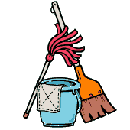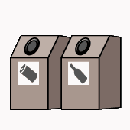 |
|
1.引越し(ウェンWhen ムーヴィンmoving) |
| |
| (1)新居での手配 Utilities and Registration |
1)住所変更通知
Contact each utility office. Because most offices do
not have English speaking staff, we recommend that you ask a friend who
can speak Japanese for assistance.
2)外国人登録書の申請及び住所変更
Apply for a Certificate of Alien Registration
and an official change of address.
新住所の区市町村役場へ行って手続きしましょう。
To acquire these documents you must go to the city ward
office of the area where you now live.
3)銀行口座の開設及び住所変更届
Open a bank account and officially change your address with your bank
4)運転免許証の住所変更 Change the address on your drivers license
新住所の所轄警察署で、必要な手続きを行ってください。
To change the address on your driver's liscense, go to the local police office
of the area where you now live.
|
| (2)挨拶(Greetings) |
万一のときに、頼りになるのは隣人です。また、今後、生活する上で、思わぬ迷惑をかけてしまうかもしれません。トラブルがあったとき、普段の付き合い方で感じ方も異なります。日頃のつき合いを大切にし、良好な関係を保つようにしましょう。
It is a good idea to greet the landlord and neighbors
when you move in. First impressions in Japan are very important. In times of emergency it is your neighbors who will help
you the most. Also, if you have a good relationship with your neighbors
they are less likely to complain about noise and other disturbances.
|
日 本 語 |
英 語 |
発 音 |
| こんにちは |
kon-nichiwa |
Hello |
| ごめんください |
Gomen-kudasai |
Excuse me, but is anybody home? |
| はじめまして |
Hajimemashite |
How do you do? |
| よろしくおねがいします |
Yoroshiku onegai-shimasu |
I'm pleased to make your acquaintance. |
| わたしは**です |
Watashi ha (****)desu. |
My name is (****) |
| ありがとう |
Arigatou |
Thank you |
| すみません |
Sumimasen |
Good bye |
| おげんきですか |
Ogenki-desuka |
How are you doing? |
| げんきです |
Genki-desu. |
I'm fine thank you. |
| どういたしまして |
douitashimashite |
You are welcome. |
| ひっこしてきました |
Hikkoshite-kimashita |
I moved into *** |
|
| (3)入居時の修理(リペアーズRepairs ビフォアbefore ユーYou
ムーヴmove インin) |
入居前には、ひどく傷んだり壊れたりした箇所は修理してあります(畳・ふすま・壁・塗装等をすべて新しくするわけではありません)。もし、疑問に思うことがあれば、入居後すぐに担当者に問い合わせましょう。時間が経過してから申し出をしても、応じてもらえない場合があります。
1.When You Move In
Before moving into an apartment that has had previous tenants any severe
wear or damage will have been repaired, however this does not mean that
the unit will have been completely refurbished with new tatami mats, sliding
doors, wall surfaces, paint, etc... Contact your real estate agent immediately
if you have any questions about repairs when you move in. Please note
that a request for repair work can only be accepted if the problem is
reported without delay.
|
 |
| 2.室内清掃(Taking care of your new home) |
| (1)新築住宅の湿気(ヒューミダティーHumidity) |
建設されて間もない住宅は、かなり湿気があるため、カビがはえることがあります。天気のよい日には窓をあけ風通しをよくし、壁・押入れ・天袋などを乾燥させてください。
Due to the relatively high humidity inside recently built housing, you should take extra care to avoid mold buildup. On sunny days it is best to air out rooms and allow the walls, closets, cupboards, etc., to dry out.
|
| (2)結露(カンデンセイシュンCondensation) |
梅雨の時期や冬に暖房をすると壁に水滴がつきます。放置するとカビが発生しますので、乾いた布でふきとったり、ワイパーで取り除くと共に換気を行います。
特に北側の部屋・押入には注意して、通風を良くするようにしてください。
Heating in the winter may cause drops of water to condense on the walls
and give rise to mold. Be especially careful about condensation in rooms
and closets on the northern side of a building. Keep these rooms well
aired out and wipe away any condensation droplets that may form with a
dry cloth.
|
日本の気候は、温暖多湿なので、梅雨の時期や夏は湿気が多く、また、冬は暖房により窓ガラスや壁に結露ができます。放置するとカビが発生しますので、結露が発生した場合は、乾いた布でふきとると共に換気を行います。
The climate in Japan is warm and humid. During the rainy season and the summer,
humidity is high, and during the winter the use of heaters causes condensation on windows and walls. If this condensation is not dealt with properly, mold
will follow.
If you notice condensation in your room, wipe it up with a dry cloth and ventilate
the room well.
|
また、押入の中も結露しやすいので、換気に気をつけます。特に、梅雨の時期や冬はふすまの両端を少し開けて、換気をするように心がけましょう。
As the insides of oshi-ire are also prone to condensation,
ventilate them well. During the rainy season and winter, opening both
fusuma a bit at the edges helps keep an oshi-ire's interior dry.
|
 |
3.ゴミ(ガーベジGarbage) |
ゴミは、所定の場所に可燃ゴミ、不燃ゴミに分け、それぞれ指定されている日に出して下さい。
Sort your garbage into combustible and incombustible trash, and put each
out in the designated place on the appropriate collection day. |
ゴミをベランダなどに放置すると、害虫の発生、悪臭などで近隣にも迷惑を及ぼしますので、注意しましょう。
Do not leave garbage on the veranda or in other places where it might
cause a nuisance to neighbors by attracting insects, giving off odors,
etc.
|
バルコニー、廊下・階段、窓などから、ゴミや水を決して捨てないようにしてください。
Do not, under any circumstances, throw garbage or water from a balcony
or window, in the corridors, on stairs, etc.
|
家具や電化製品などの粗大ゴミは、普通のゴミ置場ではなく、清掃事務所に連絡して取りに来てもらいます。リサイクルを利用してもよいでしょう。
Don't put large sized rubbish such as furniture and electrical
goods where you put out the daily garbage. In order to dispose of such
items you must phone the waste management office and arrange for their
disposal. Another way to get rid of these types of items, is to selling
them at a secondhand shop.
|
 |
4.騒音(ノイズNoise) |
コンクリート住宅は、意外に音が伝わりやすいものです。
Sound travels through a concrete building more easily than you might think. |
多数の来客があった場合、大声で騒ぐことは控えてください。
When you have guests, refrain from raising your voices loudly.
|
夜間に廊下を歩く音や階段を昇る音、また、窓を開け放したままの話し声やドアの開閉音など意外と大きく聞こえるものです。特に深夜の騒音は睡眠の妨げとなるので、十分注意して、静かな環境をつくりましょう。
At night, footsteps in the hallway, people going up the
stairs, voices heard through open windows, and doors opening and closing
sound even louder. Noise late at night in particular can disrupt your
neighbor's sleep. Ensure that you do your part to maintain a quiet environment.
|
子供の飛び跳ねる音は、階下にはかなり響くので注意しましょう。また、掃除機、洗濯機は大きな音が出て、近所の迷惑になります。朝は8時頃から、夜は9時頃までにしましょう。
Remember that the sound of a child jumping up and down
reverberates quite loudly in the unit below. Vacuum cleaners and washing
machines tend to be quite noisy and may bother your neighbors. Try to
use them between 8 o'clock in the morning and 9 o'clock at night.
|
| <**騒音防止の工夫(Some devices for soundproofing) |
音が伝わりやすい板床にはカーペットを敷く。また、裏がフェルト地などのやわらかい素材でできた室内ばきを使うと音があまり気にならない。
Try spreading a carpet over a wooden floor and put on
slippers with soles made of soft material such as felt.
|
隣室に接する壁には本棚や洋服ダンスをおく
Put a book shelf or wardrobe against walls that adjoin
neighboring units.
|
オーディオやテレビなど音が出るものは壁から少し離して設置し、直接、床におかない。
Set your TV or audio equipment away from the wall, or not to put them directly on the floor.
|
椅子の足にキャップをかぶせる。
Cover the feet of your chairs with fabric or rubber caps.
|
ドアを閉める音の対策には、ウレタンの隙間用テープを扉枠のドアがあたる部分に貼る。音が吸収されるだけでなく、隙間風防止にも有効。
If you are concerned about the loud noise your closing door makes, paste polyurethane tape
on the door
frame. Not only is it soundproof, but it also fills the gap between the door and the frame, providing insulation.
|
流しの排水パイプには、ボロ布などを巻くと水の流れる音が小さくなる。
Try wrapping rags around drainpipes to make the sound of water flow less audiable. |
洗濯機の騒音には、防振マットを敷くと、振動音が減る。
Place a sound dampening mat under the washing machine.
|